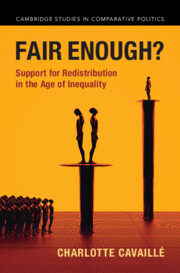Book contents
- Frontmatter
- Dedication
- Contents
- Figures
- Tables
- Acknowledgements
- 1 Demand for Redistribution in the Age of Inequality
- Part I Demand for Redistribution: A Conceptual Framework
- 2 What Is Fair?
- 3 Unpacking Demand for Redistribution
- 4 As If Self-interested? The Correlates of Fairness Beliefs
- 5 When Material Self-interest Trumps Fairness Reasoning
- Part II Changes in Demand for Redistribution
- 6 Explaining Stability and Change
- 7 Fiscal Stress and the Erosion of Social Solidarity
- 8 Partisan Dynamics and Mass Attitudinal Change
- 9 How Proportionality Beliefs Form
- 10 The Nature and Origins of Reciprocity Beliefs
- Conclusion
- References
- Index
- Cambridge Studies in Comparative Politics
8 - Partisan Dynamics and Mass Attitudinal Change
Published online by Cambridge University Press: 07 September 2023
- Frontmatter
- Dedication
- Contents
- Figures
- Tables
- Acknowledgements
- 1 Demand for Redistribution in the Age of Inequality
- Part I Demand for Redistribution: A Conceptual Framework
- 2 What Is Fair?
- 3 Unpacking Demand for Redistribution
- 4 As If Self-interested? The Correlates of Fairness Beliefs
- 5 When Material Self-interest Trumps Fairness Reasoning
- Part II Changes in Demand for Redistribution
- 6 Explaining Stability and Change
- 7 Fiscal Stress and the Erosion of Social Solidarity
- 8 Partisan Dynamics and Mass Attitudinal Change
- 9 How Proportionality Beliefs Form
- 10 The Nature and Origins of Reciprocity Beliefs
- Conclusion
- References
- Index
- Cambridge Studies in Comparative Politics
Summary
Chapter 8 traces the unexpected empirical patterns described in Chapter 1 to belief change and framing effects, themselves triggered by changes in how elites compete over redistributive issues. In line with the argument presented in Part 1, it also shows that belief change plays out differently depending on (1) which type of fairness beliefs is affected by partisan dynamics (proportionality or reciprocity) and (2) people’s position as net beneficiaries (or net contributors) of redistribution to policies, as proxied by their income level. In Great Britain, in particular, I find that framing effects tied to survey design further explain how belief change affects answers to the traditional redistribution question. In the United States, the decline in the size of the income gradient follows from the politicization of redistribution to policies (and reciprocity concerns) over redistribution from policies (and proportionality concerns). Against common expectations, the decline in the income gradient originates in growing support for redistribution among rich Democrats, not declining support among poor (often white) Republicans.
Keywords
- Type
- Chapter
- Information
- Fair Enough?Support for Redistribution in the Age of Inequality, pp. 164 - 202Publisher: Cambridge University PressPrint publication year: 2023

